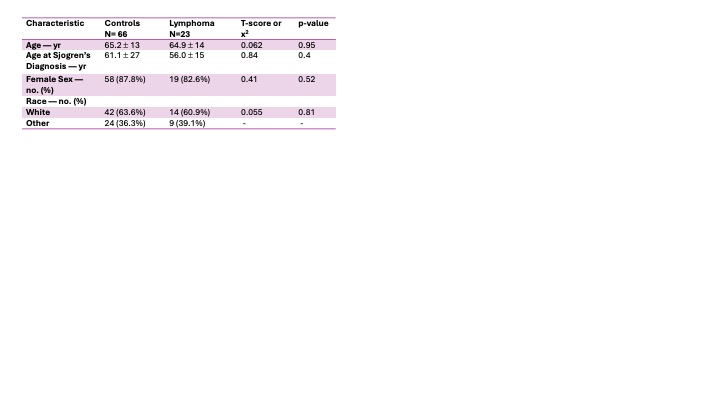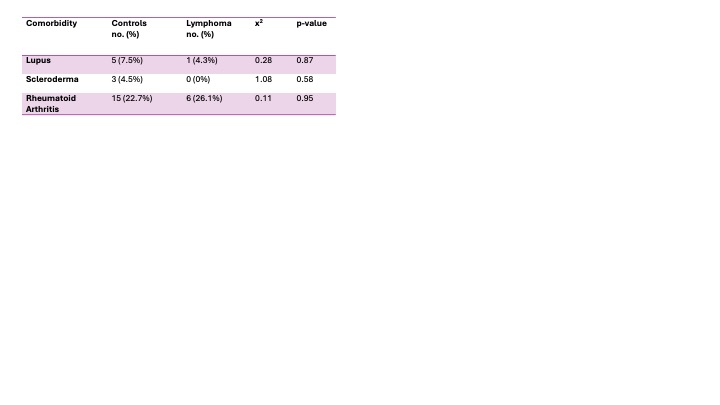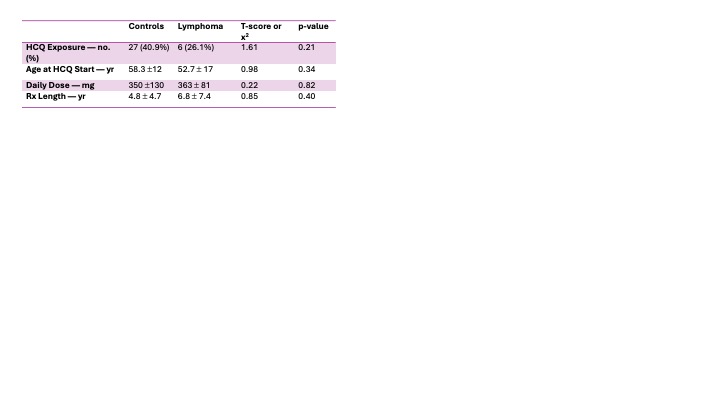Session Information
Session Type: Poster Session C
Session Time: 10:30AM-12:30PM
Background/Purpose: Sjogren’s disease is an autoimmune disorder characterized by chronic lymphocytic inflammation of the salivary and lacrimal glands. Affected individuals are at heightened risk of developing Non-Hodgkin lymphoma (NHL) in mucosa-associated lymphoid tissue. Hydroxychloroquine (HCQ), also known as Plaquenil, is an old disease-modifying antirheumatic drug that has demonstrated efficacy in the treatment of musculoskeletal discomfort and mild inflammatory arthritis in Sjogren’s disease. Given the immunomodulatory properties of hydroxychloroquine, it has been postulated that the drug may exert a protective effect against lymphoma progression. However, the available evidence on the association between HCQ use and the risk of lymphoma development in Sjogren’s disease has been limited. The purpose of this study is to determine whether subjects with lymphoma in Sjogren’s disease have a lower odds of exposure to hydroxychloroquine compared to demographic and age-matched controls.
Methods: This is a retrospective case control study on patients seen between Jan 1st, 2012 and Aug 1st, 2023 at UC San Diego Health. Demographic and drug information were collected via chart review. Qualifying patients were age 18+ with at least once visit to UCSD Oncology or Rheumatology with an associated Sjogren’s or Non-Hodgkin’s Lymphoma (NHL) diagnosis. In patients with NHL, those with prior history of malignancy with chemotherapy or radiation, or who were started on hydroxychloroquine solely after NHL diagnosis, were excluded. Autoimmune Score (based on diagnosis of systemic lupus erythematosus, scleroderma, and rheumatoid arthritis) and Chronic Disease Score (based on diagnosis of hypertension, hyperlipidemia, and type 2 diabetes) were calculated to create age and disease- matched controls for each NHL patient. Exposure criteria to HCQ was defined as greater than 6 months of use based on written prescription activity in the EHR. Patient clinical and demographic features were compared using independent sample T test and Pearson’s chi-square test. The odds ratio of exposure to hydroxychloroquine was calculated with a confidence interval of 95%.
Results: Demographic characteristics between control and lymphoma groups were similar (Table 1A and 1B). The most common dose of hydroxychloroquine across both groups was 200 mg dosed twice daily. The average prescription length for control and lymphoma groups was 4.8 and 6.8 years, respectively. 27 (40.9%) of controls and 6 (26.1%) of the lymphoma group were exposed to hydroxychloroquine, yielding an odds ratio of 0.51 (0.18, 1.46) with a p-value of 0.32.
Conclusion: Several studies have published on the immunomodulating effects of HCQ in autoimmune disease, showing that the drug increases serum C4 complement activity and decreases total immunoglobulin levels, both of which are independent risk factors for lymphoma development in Sjogren’s disease. This retrospective study suggests that individuals diagnosed with NHL in Sjogren’s disease exhibit a decreased odds of exposure to hydroxychloroquine when compared to non-cancer controls. However, it is important to note that this observed difference did not reach a statistically significant level.
To cite this abstract in AMA style:
Xue C, Guma M, Nguyen K. Hydroxychloroquine and the Risk of Lymphoma Progression in Sjogren’s Disease: A Retrospective Case Control Study [abstract]. Arthritis Rheumatol. 2024; 76 (suppl 9). https://acrabstracts.org/abstract/hydroxychloroquine-and-the-risk-of-lymphoma-progression-in-sjogrens-disease-a-retrospective-case-control-study/. Accessed .« Back to ACR Convergence 2024
ACR Meeting Abstracts - https://acrabstracts.org/abstract/hydroxychloroquine-and-the-risk-of-lymphoma-progression-in-sjogrens-disease-a-retrospective-case-control-study/



